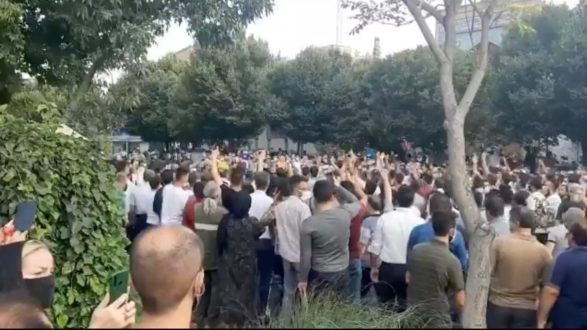RFL/RE – Angry protests against water shortages and deteriorating economic conditions in Iran continued to expand, a day after demonstrators in Tehran made a rare display of open discontent with the country’s Islamic leadership.
Late on July 26, protesters in the city of Karaj, the capital of Alborz Province, chanted “Death to the dictator,” the same slogan that was heard earlier in the day in the capital, as well as, “Don’t be afraid, don’t be afraid, we are all together” and, “From Karaj to Khuzestan, unity, unity.”
The spread of protests comes as Iran struggles through another wave of the coronavirus pandemic and the economy continues to suffer under strict U.S. sanctions, while the consequences of the drought have been exacerbated by poor water-management policies that have hurt agriculture and left reservoirs in the country with little water.
The demonstrations began on July 15 in dozens of towns and cities in Khuzestan, an oil-rich province that has a large ethnic Arab population, amid the worst drought in Iran in at least 50 years, which has triggered weeks of power blackouts in several parts of Iran.
RFE/RL’s Radio Farda cited videos posted on social media from Karaj on July 27 showing large numbers of protesters gathering around a highway bridge chanting, “Reza Shah, bless your soul,” in reference to former Iranian ruler Reza Shah Pahlavi, the founder of the modern Iranian state, and chanting slogans against the paramilitary Basij forces.
Karaj: “Reza Shah, bless your soul.”Today is the 77th anniversary of the death of Reza Shah Pahlavi. Karaj #Iran was the scene of a popular uprising against the regime in Nov 2019 (Aban). Karaj could become a leading driver of current uprising.pic.twitter.com/RDrV0EL50O— Alireza Nader علیرضا نادر (@AlirezaNader) July 26, 2021
Reza Shah Pahlavi, who died on July 26, 1944, was the father of Mohammad Reza Pahlavi, the last imperial ruler of Iran who was overthrown by the Islamic revolution of 1979 led by Ayatollah Ruhollah Khomeini, the predecessor of the current supreme leader of Iran, Ayatollah Ali Khamenei.
Radio Farda also reported that medical staff at the Khomeini Hospital in Karaj chanted slogans such as, “Death to the dictator” and, “Enough promises, our table is empty.”
The protests in Karaj came after videos and texts posted on social media indicated that a protest rally was also staged during the morning of July 26 on Jomhuri Islami Avenue in central Tehran — the first indication that the discontent has spread to the capital.

Tehran’s Deputy Governor Hamidreza Goodarzi confirmed that the protest had taken place, saying the demonstration was over a “lack of electricity.”
RFE/RL reported that demonstrators in Tehran also expressed support for protesters in Khuzestan and other Iranian cities who have staged defiant rallies over water shortages.
In one video from Tehran, protesters expressed discontent with the conservative Islamic clerics who control political life in Iran, chanting, “Cannons, tanks, fireworks, mullahs must go.”
In other videos, young demonstrators chanted, “Shame on Khamenei, your country” and, “Let go!”
Still others chanted, “Neither Gaza, nor Lebanon, I sacrifice my life for Iran.”

That slogan has been chanted for decades by those who oppose the Iranian government’s policy of providing financial aid and weapons to Palestinian militant groups and Hizballah fighters in Lebanon.
Thousands of workers in Iran’s oil industry also have launched strikes for better wages and working conditions.
At least five demonstrators have been shot dead across Iran in the protests. Human Rights Watch (HRW) says the deaths were the result of the apparent use of “excessive force” by Iranian authorities.
HRW has urged Iranian authorities to “transparently” investigate the reported deaths and to deal with those were responsible for the violence.
“Iranian authorities have a very troubling record of responding with bullets to protesters frustrated with mounting economic difficulties and deteriorating living conditions,” Tara Sepehri Far, an Iran researcher at HRW, said.
 Shabtabnews In this dark night, I have lost my way – Arise from a corner, oh you the star of guidance.
Shabtabnews In this dark night, I have lost my way – Arise from a corner, oh you the star of guidance.



